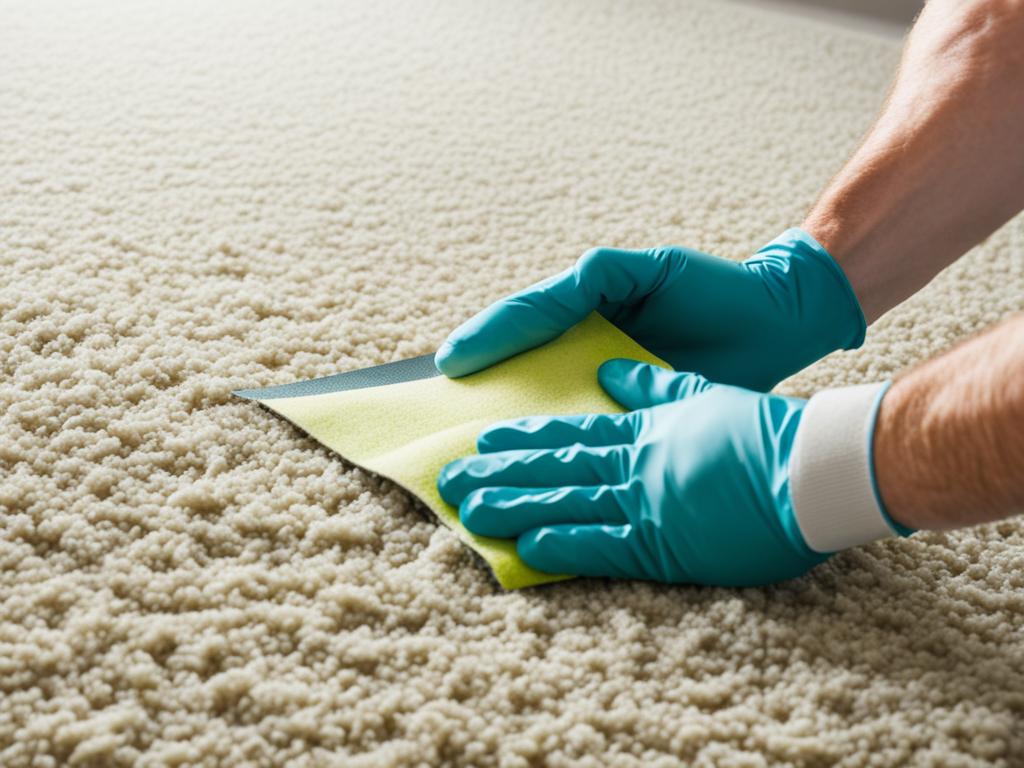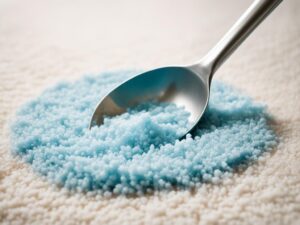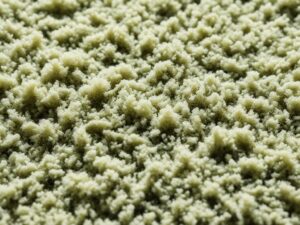After investing time and effort into cleaning your carpet, it can be frustrating to discover a lingering smell. There are several factors that may contribute to this unpleasant odor. Understanding the causes of carpet odor can help you eliminate it and achieve fresh-smelling carpets in your home.
Key Takeaways:
- Low-quality carpet cleaning solutions and improper drying techniques can lead to carpet odor.
- Old stains and spills that have reached the underlay can contribute to a persistent smell.
- Cigarette smoke and pet urine are common sources of carpet odor that may require professional intervention.
- Avoid actions that can worsen the smell, such as placing furniture on wet spots or attempting to vacuum moisture out on your own.
- Home remedies like vinegar solution and baking soda can help eliminate carpet odor, along with utilizing dehumidifiers and fans to aid in the drying process.
Low-Quality Carpet Cleaning
Cheap carpet cleaning services can result in subpar cleaning outcomes and unpleasant odors. These services often utilize inexpensive, inferior equipment that lacks the power to effectively extract all the water from your carpet. As a result, your carpet may remain damp, creating an environment conducive to a foul smell.
In addition, inexperienced carpet cleaners may exacerbate the issue. They may make the mistake of using excessive amounts of detergent, hoping to achieve better cleaning results. However, this can backfire and leave behind residue that contributes to the unpleasant odor. Moreover, insufficient rinsing can lead to the accumulation of cleaning agents in the carpet fibers, further intensifying the smell.
It’s crucial to choose a reputable carpet cleaning service that employs experienced and well-trained professionals. Such providers utilize high-quality equipment capable of extracting the maximum amount of moisture from your carpet. They also follow proper cleaning techniques, including using the appropriate amount of detergent and ensuring thorough rinsing, leaving your carpet clean and odor-free.
“Cheap carpet cleaning services compromise the quality of cleaning and may leave your carpet with an unpleasant smell. It’s important to invest in reputable providers who prioritize effective cleaning techniques.”
In the next section, we will address another common cause of carpet odor: drying problems.
| Pros | Cons |
| —- | —- |
| High-quality equipment | Inferior equipment |
| Proper training of cleaners | Inexperienced cleaners |
| Thorough rinsing | Excessive use of detergent |
| Effective odor removal | Insufficient extraction of water |
Drying Problems
When it comes to carpet cleaning, a wet underlay and a slow drying process can lead to troublesome issues. One of the main problems that arise from excessive moisture is the growth of mold and mildew, resulting in an unpleasant musky smell permeating your carpet. Factors such as limited air movement and lack of sunlight can exacerbate the slow drying process, further prolonging the presence of moisture in the underlay.
The Impact of a Wet Underlay
A wet underlay can severely impede the drying process of your carpet. If not addressed promptly, the trapped moisture provides an ideal environment for mold and mildew to thrive. These microorganisms release volatile organic compounds (VOCs) that emit a distinct, unpleasant odor, affecting the overall indoor air quality of your living space.
To illustrate the importance of addressing wet underlay, consider the following scenario:
| Scenario | Consequence |
|---|---|
| Carpet cleaned with excess water | Underlay remains wet |
| Moisture trapped in underlay | Mold and mildew growth |
| Presence of mold and mildew | Musky smell permeates the carpet |
To prevent the development of mold and the accompanying musky odor, it is crucial to address wet underlay promptly and implement effective drying methods.
A Slow Drying Process and Its Consequences
A slow drying process is often a result of various factors, including high humidity levels, limited airflow, and inadequate ventilation in the room. The longer your carpet remains damp, the higher the likelihood of mold and mildew formation. These fungal growths can not only compromise the integrity of your carpet but also pose health risks for occupants, especially those with respiratory issues or allergies.
To better understand the implications of a slow drying process, consider this example:
| Factors | Consequences |
|---|---|
| High humidity | Prolonged drying time |
| Limited airflow | Moisture remains trapped in the carpet |
| Prolonged moisture | Mold and mildew growth |
| Mold and mildew growth | Unpleasant odor and health risks |
To mitigate the risk of mold and mildew development and eliminate the accompanying odor, it is imperative to address the root cause of the slow drying process and expedite the drying time.
Proper ventilation and airflow are essential for facilitating the drying process and preventing the growth of mold and mildew. Here are some practical steps to ensure better drying:
- Open windows and doors to enhance air circulation
- Use fans and dehumidifiers to reduce humidity levels
- Direct sunlight onto the carpet, if possible
By prioritizing these measures, you can minimize the risk of drying problems, effectively eliminate the mold and mildew smell, and restore your carpet to its fresh, odor-free state.
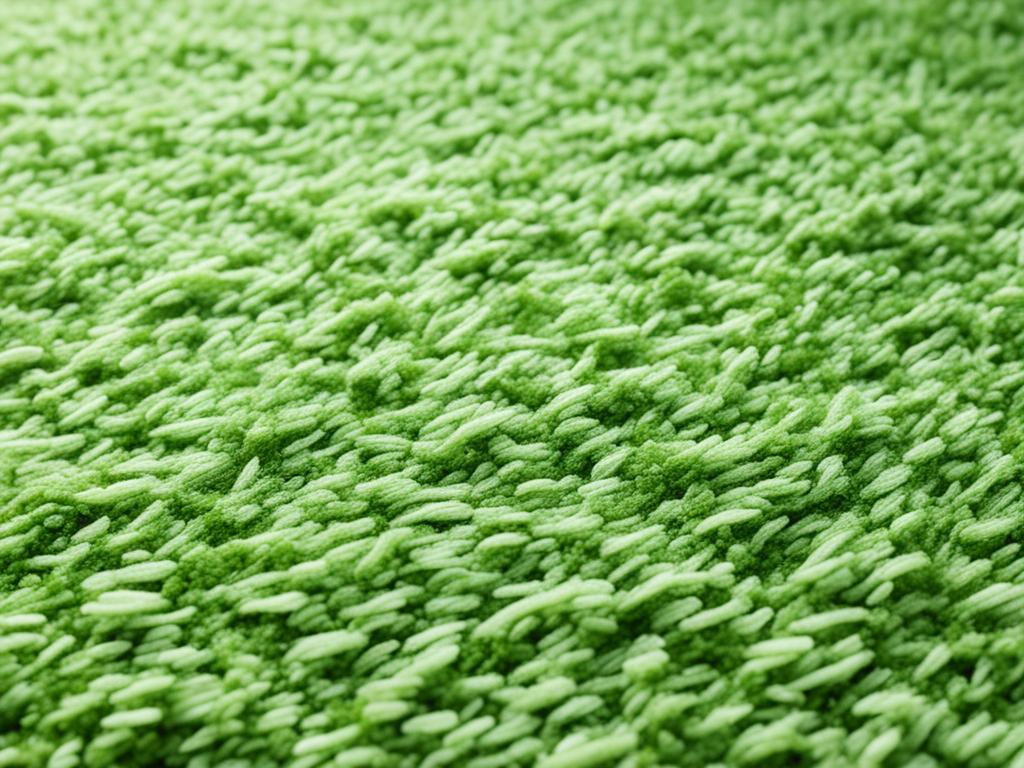
Persistent Stains
Old or persistent stains can be a major cause of bad smells in your carpet, even after cleaning. These stubborn stains have a way of seeping through the carpet and reaching the underlay, which can absorb both the stain and the accompanying odor. Unfortunately, this makes it quite challenging to completely remove them.
To add insult to injury, certain stains, like wet dog smell, can be particularly difficult to eliminate. The odor tends to linger, even after deep cleaning, leaving your carpet smelling less than fresh. This can be quite frustrating.
Addressing the Underlay Absorption
The key to tackling persistent stains and their associated odors lies in addressing the underlay absorption. Since the underlay is designed to provide padding and support for the carpet, it is highly absorbent, making it susceptible to capturing any substances that penetrate the carpet fibers.
When a stain seeps through the carpet and reaches the underlay, it can be challenging to eliminate it completely. The underlay absorbs the stain and traps the odor, making it difficult to remove through normal cleaning methods.
To effectively remove wet dog smell and other odors caused by persistent stains, it may be necessary to consider specialized treatments or solutions. These treatments are designed to penetrate the underlay and target the source of the odor.
Pro Tip: Promptly tackle spills and stains on your carpet to prevent them from seeping into the underlay and causing long-lasting odors.
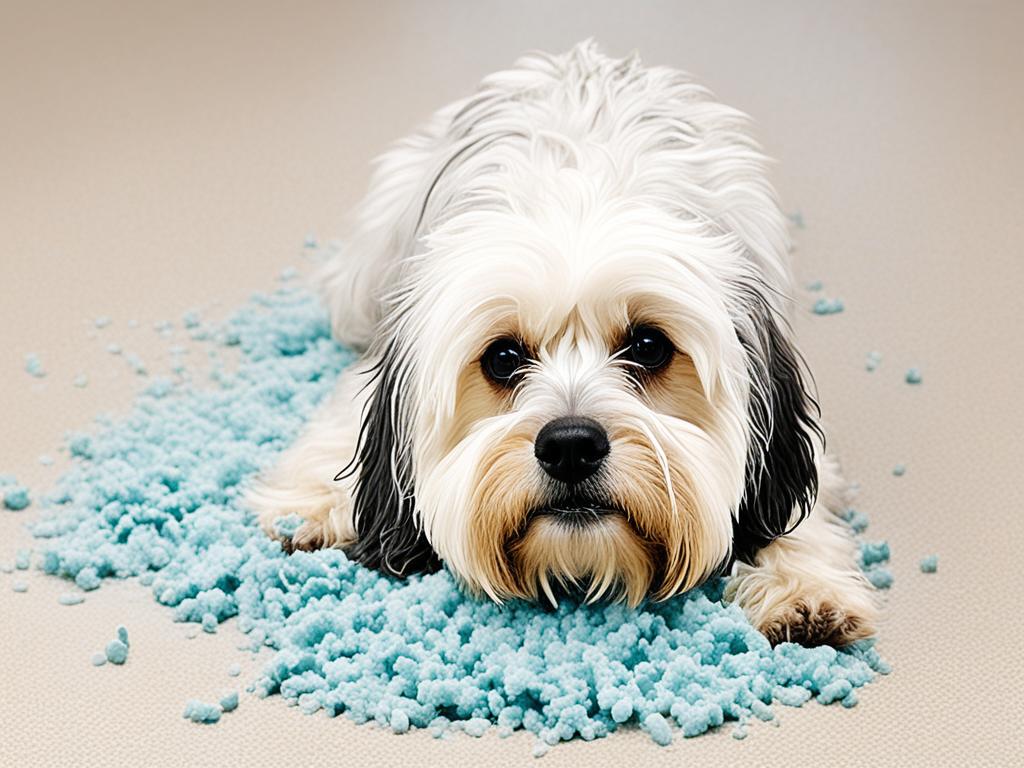
Addressing persistent stains and their associated smells requires a combination of strategies, including specialized treatments, thorough cleaning, and, if necessary, professional assistance. By targeting the source of the odor and addressing the underlay absorption, you can effectively eliminate bad smells caused by persistent stains.
Other Common Reasons for Bad Smells
In addition to low-quality carpet cleaning, drying problems, and persistent stains, there are other common reasons why your carpet may have a bad smell. These odors can be challenging to eliminate and often require professional intervention. Here are three culprits that can leave your carpet smelling less than fresh:
Cigarette Smell
Cigarette smoke has a pungent odor that can easily permeate carpets and linger for a long time. Even if you clean your carpet regularly, the smell may not completely disappear, especially if smoking occurs indoors. The particles from the smoke get trapped in the carpet fibers and can be challenging to remove with standard cleaning methods.
Pet Urine Odor
If you have pets, you’re likely familiar with the distinct odor of pet urine. When accidents happen on the carpet, the urine can penetrate deep into the fibers, reaching the padding underneath. This can result in a persistent and unpleasant smell that may require specialized enzymatic cleaners or professional carpet cleaning services to effectively remove.
Fire Damage Smell
If your carpet has been exposed to fire or smoke damage, the smell can become trapped in the fibers. Even if the visible signs of damage have been addressed, the lingering smoke odor can persist. The particles from the smoke settle into the carpet, and regular cleaning may not be enough to completely eliminate the smell.
Dealing with these types of odors can be frustrating, but it’s essential to take the necessary steps to effectively eliminate them. In some cases, professional carpet cleaning services equipped with specialized techniques and equipment may be the best solution.
Comparison of Common Carpet Smells
| Cigarette Smell | Pet Urine Odor | Fire Damage Smell | |
|---|---|---|---|
| Causes | Cigarette smoke particles trapped in the carpet fibers | Pet urine penetrating deep into the carpet and padding | Smoke odor particles settling into the carpet fibers |
| Severity | Can be moderate to strong, depending on smoking frequency | Can be moderate to strong, depending on urine concentration | Can be moderate to strong, depending on the extent of fire damage |
| Removal Difficulty | Can be challenging, may require professional intervention | Can be challenging, may require specialized cleaners or professional services | Can be challenging, may require specialized techniques and equipment |
| Recommended Solution | Professional carpet cleaning utilizing odor-neutralizing techniques | Specialized enzymatic cleaners or professional carpet cleaning services | Professional carpet cleaning with specialized techniques and equipment |
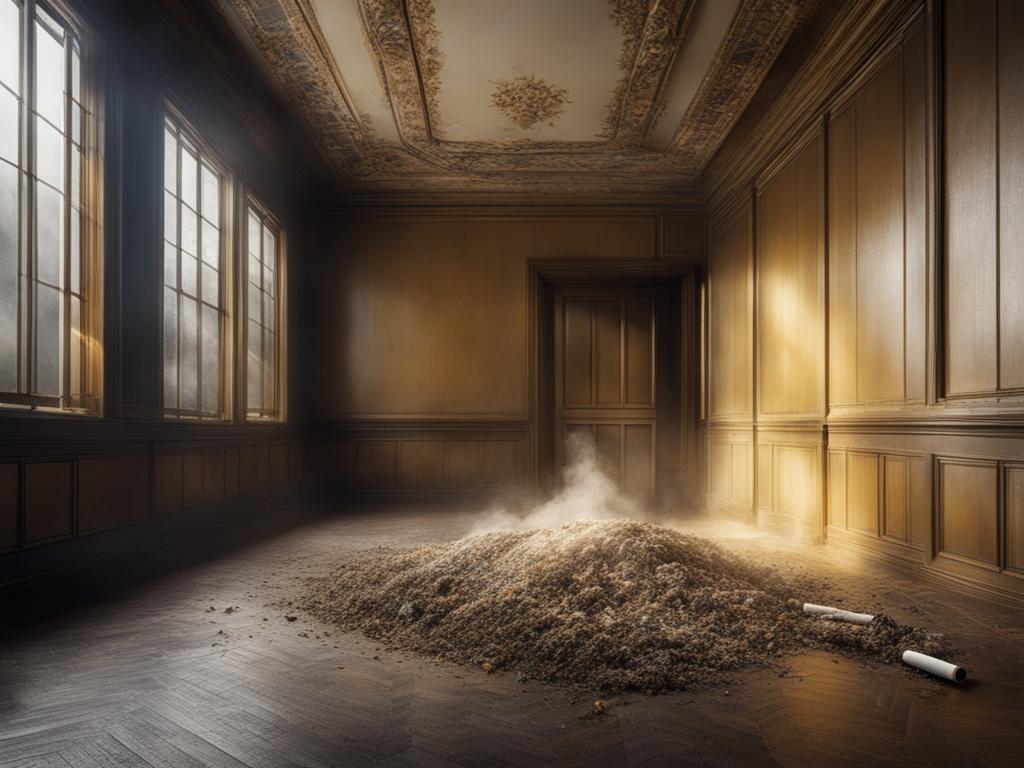
What to Do and Not Do When You Have a Smelly Carpet
When confronted with a smelly carpet, it’s important to know what actions to take and what mistakes to avoid. By following these carpet care tips and preventing further damage, you can effectively eliminate unpleasant odors and restore the freshness of your carpet.
- Do not place furniture on wet spots: Placing furniture on wet areas can hinder the drying process, trapping moisture and dirt in the carpet fibers. This can lead to a worsening of the smell and potential damage to your carpet. Instead, wait for the carpet to dry completely before returning furniture to its original position.
- Do not walk on wet carpet: Walking on wet carpet can push moisture deeper into the fibers, making it even more difficult for the carpet to dry properly. This can not only prolong the odor issue but also potentially cause mold and mildew growth. It’s important to avoid walking on wet carpet and restrict access to the area until it is completely dry.
- Do not attempt to vacuum moisture on your own: Vacuuming wet carpet is not an effective solution for removing moisture and eliminating odors. In fact, it can damage your vacuum cleaner and spread the moisture further into the carpet fibers. Instead, seek professional assistance for proper extraction of the moisture.
It’s crucial to avoid these common mistakes and take the necessary precautions to prevent further damage to your carpet. By doing so, you can improve the odor issue and ensure the longevity of your carpet.
Following these carpet care tips and avoiding common mistakes will help you in your efforts to eliminate carpet smells. By properly addressing the issue and preventing further damage, you can enjoy a fresh and clean-smelling carpet in your home.
Remedies for Removing Carpet Smells
If you’re dealing with unpleasant carpet odors, don’t worry! There are several effective home remedies you can try to eliminate those smells and bring freshness back to your carpets. These remedies include the use of a vinegar solution, baking soda, kitty litter, and dehumidifiers.
Vinegar Solution
The vinegar solution is a powerful natural odor eliminator that can help kill potential mildew and absorb unpleasant smells from your carpet. To create the solution, mix equal parts white vinegar and lukewarm water. Then, using a spray bottle, apply the solution to the affected areas of your carpet. Allow it to sit for a few minutes before blotting the area with a clean cloth. The vinegar will work its magic, leaving your carpet smelling fresh and clean.
Baking Soda
Baking soda is another fantastic remedy for removing carpet smells. Sprinkle a generous amount of baking soda evenly over the affected areas of your carpet and let it sit for a few hours or overnight. The baking soda particles will penetrate the carpet fibers, neutralizing odors and leaving behind a fresh scent. After the designated time has passed, simply vacuum up the baking soda for a clean and deodorized carpet.
Kitty Litter
If you’re dealing with moisture and odor issues in your carpet, kitty litter can come to the rescue. Spread a layer of kitty litter over the affected areas and gently work it into the carpet fibers. The kitty litter will absorb both moisture and odors, leaving your carpet dry and smelling fresh. After a few hours, simply vacuum up the kitty litter to reveal a clean and odor-free carpet.
Dehumidifiers
Dehumidifiers are incredibly effective in preventing further odor issues and speeding up the drying process of your carpet. Excess moisture in the air can contribute to a musty smell in your carpet, but a dehumidifier helps remove that moisture, creating a drier environment. Additionally, using fans to improve airflow can also aid in the drying process, further reducing odors and ensuring your carpet stays fresh and clean.
By utilizing these home remedies, you can effectively remove carpet smells and enjoy a fresh and inviting environment in your home. Whether you choose the vinegar solution, baking soda, kitty litter, or dehumidifiers, these remedies offer natural and budget-friendly solutions to tackle unpleasant odors in your carpets.
Conclusion
Dealing with a lingering smell after cleaning your carpet can be frustrating, but understanding the underlying causes and implementing proper cleaning and drying techniques can help you achieve fresh-smelling carpets. It’s crucial to choose high-quality carpet cleaning services that use the right equipment and have well-trained cleaners to ensure effective odor removal.
Addressing stains and spills promptly is also essential to prevent them from seeping into the underlay and causing long-lasting odors. Utilizing natural remedies such as vinegar and baking soda can be effective in removing odors, while dehumidifiers and fans can help speed up the drying process.
By following these tips and taking the right approach, you can enjoy clean and fresh carpets in your home, free from unpleasant odors. Say goodbye to carpet odor problems and hello to a healthier and more inviting living space!
